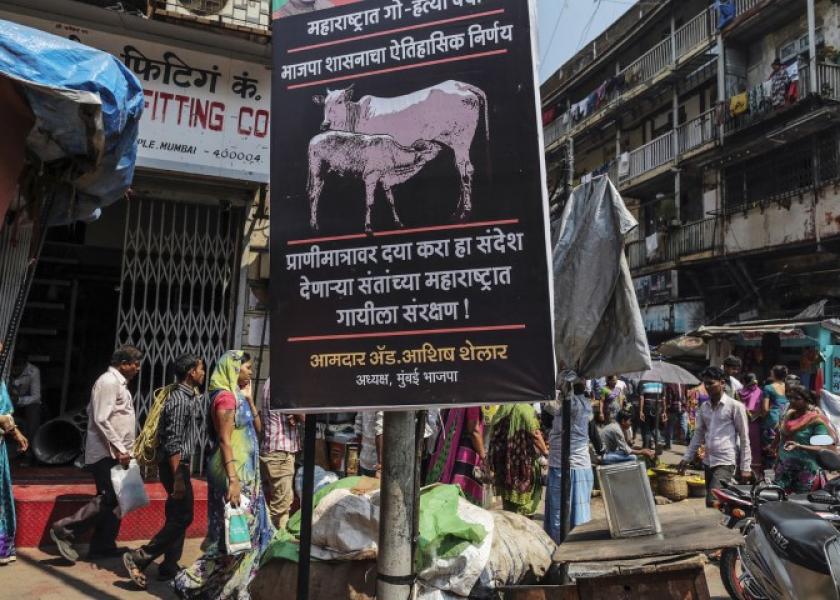Mumbai Beef Ban Sat for Decades Until Vegetarian Modi Acted

Residents of India’s financial capital could be forgiven for wondering how they suddenly face five years in prison for eating beef.
The bill, first passed in 1996, collected dust through five prime ministers. It only became law when Narendra Modi’s government, dominated by Hindu conservatives, asked the president to sign it in February -- four months after his party took power in Maharashtra, the state encompassing Mumbai.
The beef ban was among about 80 bills passed by India’s state governments that are awaiting presidential endorsement. Others include moves to ban camel slaughter in Rajasthan, upgrade a Hindu temple in Haryana and exempt bullfighting from a measure to prevent animal cruelty in Goa.
The long road to criminalize beef shows how India’s system of federalism has restrained the country’s 29 states from implementing laws that inflame religious tensions. With Modi, a professed vegetarian, holding a majority in the lower house of the national parliament for the first time and gaining control of more state governments, more initiatives may be coming.
“It’s a test for how far India can be pushed toward a conservative Hindu agenda,” Nikita Sud, an associate professor of development studies at the University of Oxford, said in an e-mail. “Changes in education, what we eat, what sort of films we watch -- that core agenda is emanating from the same organization and being tested and implemented at various central and state levels.”
Murder Charges
Other proposals are now under consideration in states controlled by Modi’s Bharatiya Janata Party. Haryana, which borders the country’s capital, may introduce a bill to ban beef and cow slaughter, India Today Magazine reported on its website. Under the rule, offenders would face murder charges, it said, citing Haryana’s Education Minister Rambilas Sharma.
The BJP set up rapid action groups of 50 men each to stop trucks carrying cattle from West Bengal state to be slaughtered in neighboring Bangladesh, a Muslim-majority country, Hindustan Times reported on Thursday.
Most in Mumbai only found out about the beef ban when Devendra Fadnavis, Maharashtra’s chief minister, thanked President Pranab Mukherjee for signing the bill in a Twitter post. Residents could previously buy beef from restaurants and sidewalk food stalls.
Several protests have emerged since it came into force. Beef traders demonstrated in Mumbai on Tuesday, while protesters in the southern state of Kerala -- where consumption is not prohibited -- cooked beef out in public and called on Maharashtra to lift the ban, NDTV reported.
Federal vs States
India’s constitution allows states to circumvent federal law on about 50 issues if they get permission from the president, a mechanism intended to unite a nation with 1.2 billion people who speak as many as 780 languages. The list includes policies related to food trade, education, bankruptcy and marriage.
When a state passes a law that may conflict with federal government policy, its governor -- who has no real power -- passes it to the Home Ministry. After consultations, the ministry can then pass it on for endorsement by the president, whose powers are also nominal.
“It’s not uncommon for state governors to defer signing of state legislation to the president of India, sometimes because of constitutional reasons, sometimes political,” said M.R. Madhavan, president and co-founder of New Delhi-based PRS Legislative Research, which tracks Indian legislation. “This is a strategy imposed by the central government if there’s legislation they don’t want states to impose.”
‘Cold Storage’
The beef ban passed the Maharashtra assembly in 1996, and the governor sent it to the Home Ministry two weeks later. It lay dormant through a previous national government controlled by Modi’s party, and wasn’t repealed when the secular Congress party ran Maharashtra from 1999 until October.
“The move was in cold storage and nobody was pushing for it,” Sanjay Jha, Congress Party spokesman, said when asked why the party didn’t withdraw the beef ban while in power. “It’s motivated and based on their political motive to create polarization.”
Fadnavis didn’t respond to several calls placed to office on Thursday. In his March 2 Twitter post, he said: “Our dream of ban on cow slaughter becomes a reality now.”
Among India’s roughly 1 billion Hindus, dairy cows are revered as sacred and vegetarianism is an ideal. Modi started his political career in the Rashtriya Swayamsewak Sangh, the ideological parent of the BJP, which has pushed to ban cow slaughter, rewrite history books and remove Shariah-based laws governing marriage and inheritance for Muslims.
Beef Sales
While Modi has focused so far on overhauling the economy and vowed strong action against groups that incite religious hatred, his links with Hindu nationalists who backed his rise to power threaten to derail his reform push. The opposition- controlled upper house has blocked key bills to allow more foreign investment and implement a national sales tax.
Beef has become big business for India, which sells meat at a discount to other suppliers in the region. Exports fetched $4.4 billion in 2013-2014, compared with $395 million a decade earlier, according to the state-owned Agricultural & Processed Food Products Export Development Authority. By comparison, the U.S. exported $6 billion of beef in the recent fiscal year.
Other states have implemented moves to protect cows under BJP administrations. The western state of Rajasthan, known for its camels and centuries-old royal families, created a department of cow welfare after the party won a 2014 election.
“In the last nine months since the BJP has come to power, the fringe elements have become the real voice,” said Maidul Islam, who teaches political science at Presidency University in the eastern Indian city of Kolkata. “This is what happens when the center and state is ruled by parties or party with same ideology.”







